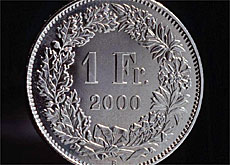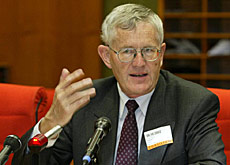EU ministers fail to agree on Swiss tax deal

European Union finance ministers have told their negotiators to continue talks with Switzerland, after they failed to hammer out an agreement on tax harmonisation.
They want Switzerland to ease banking secrecy to allow the taxation of EU citizens’ savings income in Swiss banks.
EU finance ministers meeting in Brussels on Tuesday agreed to hold further talks next week to try and hammer out a deal on proposals to clamp down on tax evasion.
Switzerland said it was ready to hold further discussions. “Switzerland remains open to talks in the context of its offer and its legal system,” said finance ministry spokesman, Daniel Eckmann.
The 15-nation bloc is divided over a Swiss offer to introduce a 35 per cent withholding tax on EU residents’ savings in Swiss banks, as an alternative to passing information about their accounts to the EU.
The main opposition to the Swiss proposal came from Luxembourg and Austria.
“One expects Austria to introduce an automatic exchange of information even when Switzerland is only willing to introduce an information exchange on request,” said Austrian finance minister Karl-Heinz Grasser.
Brussels was seeking an automatic exchange information about EU account holders, but the Swiss won’t go that far because such a move would contravene banking secrecy.
The Swiss Bankers Association said it could not understand the EU’s failure to accept Switzerland’s “very generous” offer.
“We cannot see any more room for Switzerland to extend its offer now,” spokesman James Nason told swissinfo.
Austria and Luxembourg, along with Belgium, say they won’t go along with the EU’s plans to exchange information about residents’ savings unless the Swiss are made to comply as well.
They say Switzerland would gain an unfair advantage if it retained banking secrecy, while they were forced to give it up.
The Swiss offer
The Swiss proposals include an agreement to give 75 per cent of the withholding tax directly to the EU, and a promise to encourage EU citizens to provide their tax authorities with information on their Swiss accounts.
Daniel Eckmann, a spokesman for the finance ministry, said EU citizens with accounts in Switzerland would have a simple choice.
“[They] can opt to renounce the protection banking secrecy gives and allow the bank to pass on details to the relevant tax authorities [in their country of residence],” he said. “Or they can benefit from the privacy banking secrecy provides, in which case they will pay the withholding tax.”
Switzerland’s determination to retain banking secrecy has not been the only stumbling block in negotiations with the EU over the last year. Bern is also refusing to provide information in cases of suspected tax evasion – an essential part of the EU’s tax harmonisation plans.
Under Swiss law, tax fraud is a crime, but not tax evasion. Eckmann maintains that redefining tax evasion is non-negotiable in much the same way as banking secrecy, and the two are inextricably linked.
He says that Switzerland, unlike the EU, does not have a problem of tax evasion and the offer of a withholding tax is exactly the sort of “equivalent offer” the EU is seeking from third countries.
“We have a two-pronged approach to fighting possible tax evasion,” he said. “First there is a withholding tax that exists already, and then there is a fine on top that if you fail to complete your tax returns properly.
“We have some doubts whether the information exchange system [that the EU wants] will work and we are convinced that the withholding tax system is the best solution.”
Internal pressure
EU countries themselves are divided over whether Switzerland should agree to exchange information or implement a withholding tax.
Luxembourg, Austria and Belgium, all of which have similar banking secrecy laws, have made their cooperation with the EU’s tax directive conditional on the participation of third countries such as Switzerland.
The rift could lead to a collapse of the EU’s tax harmonisation plans because acceptance of a deal with Switzerland has to be passed by a unanimous vote.
The United States is seen as decidedly lukewarm to the EU’s “Savings Tax Directive”, and indications are that the Bush administration would not be prepared to go along with it.
Scapegoat
The EU’s taxation chief, Frits Bolkestein, has suggested that some countries want to see Brussels’ tax plans derailed, and there are concerns that Switzerland might be made a scapegoat if ministers can’t agree.
“It would be unfair if the EU gave Switzerland the responsibility for the eventual non success of its [tax] directive,” Eckmann told swissinfo.
He said that although Brussels had perhaps underestimated the importance of banking secrecy in Switzerland, it had been fully aware of the competition between different financial centres in Europe.
“It is in the interests of each member state to look after their own concerns,” he said. “And it is clear that there is competition among financial centres.
“The most important thing to emphasise is that banking secrecy does not protect criminality.
“When we are made aware of organised crime or fraud, or any criminal evidence, banking secrecy is lifted.
“It is only an instrument to protect the personal sphere of individuals.”
swissinfo, Jonathan Summerton
The Swiss government has long maintained that it will not negotiate over banking secrecy.
Switzerland’s financial sector accounts for over 12 per cent of the gross domestic product.
The country manages about 35 per cent of the world’s private and international offshore funds, estimated at $2 trillion (SFr2.89 trillion).

In compliance with the JTI standards
More: SWI swissinfo.ch certified by the Journalism Trust Initiative




You can find an overview of ongoing debates with our journalists here . Please join us!
If you want to start a conversation about a topic raised in this article or want to report factual errors, email us at english@swissinfo.ch.